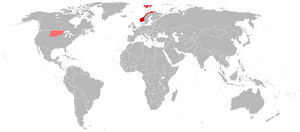Norwegian language facts for kids
Quick facts for kids Norwegian |
||||
|---|---|---|---|---|
| norsk | ||||
| Pronunciation | (East and North) (West) |
|||
| Native to | Norway | |||
| Ethnicity | Norwegians | |||
| Native speakers | 4.3 million (2012) | |||
| Language family |
Indo-European
|
|||
| Early forms: |
Old Norse
|
|||
| Standard forms |
written Bokmål (official)
• written Riksmål (unofficial)
written Nynorsk (official)
• written Høgnorsk (unofficial)
|
|||
| Writing system | Latin (Norwegian alphabet) Norwegian Braille |
|||
| Official status | ||||
| Official language in | ||||
| Regulated by | Language Council of Norway (Bokmål and Nynorsk) Norwegian Academy (Riksmål) Ivar Aasen-sambandet (Høgnorsk) |
|||
| Linguasphere | 52-AAA-ba to -be;52-AAA-cf to -cg |
|||

Areas where Norwegian is spoken, including North Dakota (where 0.4% of the population speaks Norwegian) and Minnesota (0.1% of the population) (Data: U.S. Census 2000).
|
||||
|
||||
The Norwegian language is the official language of Norway. Over four and a half million people speak it. It belongs to the group of North Germanic languages. These languages are spoken in Scandinavia. Other languages in this group include Swedish, Danish, Icelandic, and Faeroese.
Norwegian has two main written forms. They are bokmål (meaning "book language") and nynorsk (meaning "new Norwegian").
Contents
The History of Norwegian Language
Old Norse: The Viking Language

Old Norse was spoken hundreds of years ago. It was the language of Vikings in Scandinavia. This old language is very similar to today’s Icelandic language. Many Vikings sailed from Norway to Iceland. They did this to escape the Norwegian kings who made people pay high taxes.
Bokmål: Influenced by Danish
In the 13th century, a terrible sickness called the Black Death hit Norway. It killed two-thirds of the people. The Danish kings and queens saw that Norway was weak. So, they took control of Norway, making it part of Denmark.
For many years, Danes ruled Norway. Most rulers, priests, and important people were Danish. Many of them moved to Norway. This is why today's standard Norwegian, called Bokmål, is similar to Danish. Norwegians were not allowed to print books in their own language. If they wanted to study, they had to go to Denmark or Germany.
In 1814, Denmark lost a war. They had to give Norway to Sweden. After this, Norwegians were allowed to have their own university. Over time, the Danish language mixed with Norwegian dialects. This mix became today’s Norwegian language. Written Norwegian and Danish look very similar. However, they sound different when spoken. Danish often "swallows" many sounds.
Nynorsk: A Newer Form
During the 19th century, some people created a different form of Norwegian. This eventually became known as “Nynorsk.” It was based on older Norwegian forms and local dialects.
In the 20th century, there were attempts to combine Bokmål and Nynorsk into one language. But these attempts did not work. Today, about one in nine or ten people in Norway writes Nynorsk. Children in school learn both forms of the language.
The Norwegian Alphabet
The Norwegian alphabet has 29 letters. It uses all the letters from the English alphabet. Plus, it has three extra vowels: [æ ø å] Error: {{Lang}}: text has italic markup (help).
The letters c, q, w, x, and z are not often used. They are mostly found in words borrowed from other languages.
Images for kids
See also
 In Spanish: Idioma noruego para niños
In Spanish: Idioma noruego para niños
 | Percy Lavon Julian |
 | Katherine Johnson |
 | George Washington Carver |
 | Annie Easley |



